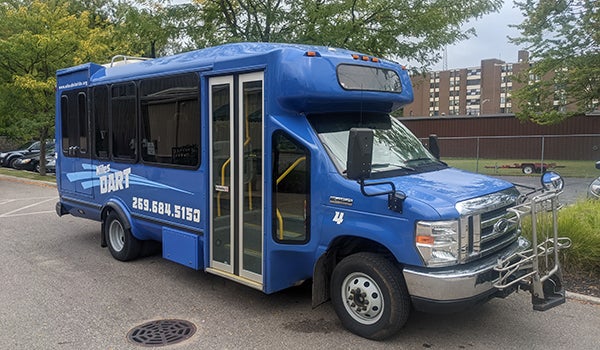Residents wait for answers to public transportation challenges
Published 8:17 am Thursday, April 4, 2019

- Laura Hollister and her son, Nathan, pose for a photo inside their home. Nathan has Kabuki syndrome and is disabled. Hollister hopes to attend an upcoming forum to address better transportation for people with disabilities. (Leader photo/KELSEY HAMMON)
NILES — Just hours before she had to take her son, Nathan, who has special needs, to see a neurologist, Laura Hollister’s car broke down.
There was the option of local transportation. The bus that served her area, however, required at least a 24-hour call in advance. Hollister, of Niles, felt her mounting frustration in the situation, culminating into the overwhelming feeling that she was stuck and there was nothing she could do about it.
“There was no way to juggle the buses and the stops in a way that could get us to the appointment and back home,” Hollister said. “We literally could not get there.”
As a mother of two children with disabilities, Hollister said she knows many other families across Berrien and Cass counties feel the same way. Whether it is getting to a doctor’s appointment, a job or just getting out of the house, many in the county without their own transportation have restricted options for travel.
While the county is discussing the potential consolidation of the area’s multiple public transportation systems, in the hopes of increasing communication between the entities and providing better service to riders, Hollister said she hopes to see them take into account feedback from those with disabilities and passengers who depend on the service.
Hollister and many others will get the chance to share their ideas for a solution with public transportation leaders, thanks to a disability advocacy group looking to give them the opportunity.
Forum seeks feedback
The Disability Network Southwest Michigan and the Self-Advocates of Michigan Board will host a Berrien County Community Forum on Transportation at 1 p.m. Friday, April 12 at the Disability Network office, 2900 Lakeview Avenue, St. Joseph.
The forum will include a chance for community members to discuss transportation issues with leaders of local transit operations, including Berrien County Community Development Transportation & Planning, Berrien County Mobility Manager, Berrien Bus, Benton Harbor Dial-A-Ride (TCATA), Buchanan Dial-A-Ride, Niles DART.
Lewis Whalen, the program director for the Disability Network Southwest Michigan, said the organization wanted to give a voice to people with disabilities and who depend on transit for day to day needs. Whalen said it would also be an opportunity to share what riders like and what they appreciate about the transportation available.
Whalen said he had heard a few concerns.
“People call for a ride and can’t be picked up for a few hours,” he said. “That can be really detrimental and make it impossible to get to a medical appointment or a job on time.”
A local family wants better
Hollister will be the first to tell anyone that her family usually has access to their own transportation and that they own several cars. The day her car broke down happened to be a particularly unfortunate circumstance when no other vehicles were available. However, she said if public transportation were more accessible to her family, she could see her sons having more independence. For Nathan, 28, who has Kabuki syndrome, a disorder that affects the various parts of the body, Hollister said it could mean taking classes at the YMCA or participating in other activities that would prove his ability.
Roughly 14 percent of Berrien County’s population is disabled, according to data from the Annual Disability Statistics Compendium. That amounts to about 21,633 people in a county of 154,339.
Hollister said limited hours and confusing jurisdiction that leave a rider questioning what bus can get them where further complicates it.
“Having a service that cuts off at 5 p.m., you are not going to have a social life,” Hollister said. “You are lucky if you can find a job that will work with those hours.”
While Whalen said the primary goal of the upcoming forum is getting transit operators and those who depend on the system in the same room, he hopes to initiate a conversation at the county level, too.
Proposed reform to local transit
For nearly a year, a group called Connect Berrien has been working to gain public feedback on a plan to consolidate the four public transportation entities: Berrien Bus, Twin Cities Area Transit Authority, Niles Dial-A-Ride Transportation, and Buchanan Dial-A-Ride.
The group identified that one of the county’s public transportation issues is that these entities do not collaborate on the operation, making hours limited and expending resources that could potentially be better used if they were one, the group has argued.
During their community presentations, Connect Berrien said consolidation could solve several of public transit riders’ problem.
The consolidation proposal, created by California-based consultants Nelson/Nygaard, included offering seven-day service in higher density areas, like Niles, on-demand service for shorter trips, fixed-service routes, including Niles to Benton Harbor and Niles to South Bend and even Michigan City. The proposal includes coverage of the entire county, and project leaders boasted the potential to see a 56 percent increase in ridership.
Due to extended hours proposed, project leaders estimated that the new system would cost about $6.3 million annually to operate, while the current system requires about $4.3 million to run annually.
During a phone interview last week, Pat Brandstatter, who helped lead the presentations as part of the Steering Committee, said other than to advocate for a solution, the issue is no longer in the hands of Connect Berrien.
“The whole premise of this is we needed a recommendation, and we have got to find the means or the way, both politically and willfully to find a solution and to say ‘how do we put all this together and make it work for everybody?’” Brandstatter said.
County leaders voted to form a committee to tackle the issue earlier this year. Last week, Brandstatter gave a presentation with the information to Berrien County Commissioners.
Brandstatter commended the Disability Network Southwest Michigan and the Self-Advocates of Michigan for hosting the forum.
“I think they are doing their part to try to highlight the importance of transportation and the issues it is creating for all those entities that are currently trying to serve the needs of people they support,” Brandstatter said. “I’m very grateful they are doing that. Again, my role at this stage is to advocate and educate.”
He encouraged others to get involved.
“The more people that know that this is something that is critically important, not just to the welfare of our community but to the economic development and growth of our community, [then] the more pressure we can put on elected officials,” Brandstatter said. “My goal is to get something done.”
For her part, Hollister said she will be attending the upcoming forum and hopes to see others from their community share their stories. For those who do not understand the seriousness of the transportation issue, she challenged them to take the bus to their next destination.






